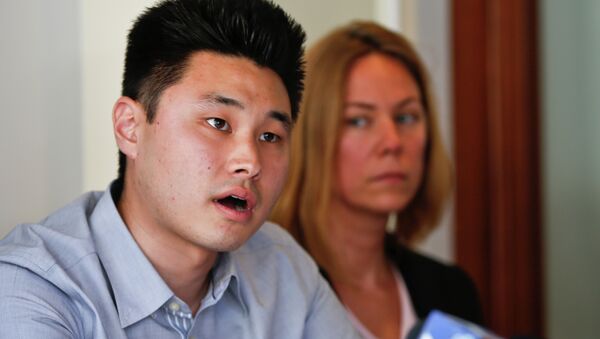Not receiving any food or water during the five terrifying days, Chong was forced to drink his own urine to survive. Believing he was going to die, he even bit into his glasses to break them, so that he could use a shard of glass to attempt to scrawl a farewell message to his mother into his own arm.
“I didn’t just sit there quietly. I was kicking the door yelling,” Chong said last year at a news conference where he spoke about his near-death experience.
Chong explained that he had slid a shoelace under the door, in an attempt to gain the attention of the guards. He has stated the attempt was in fact successful, and that “five or six people” came to the cell where he was starved and lying in his own feces.
Upon his discovery, Chong had lost 15 pounds, and was hospitalized for five days to treat dehydration, kidney failure, a perforated esophagus, and cramps.
At a hearing on Tuesday, US senators attempted to get answers on how the DEA left the man to nearly die while in their custody. So far, any attempts to receive answers have been met with silence and no charges were ever filed against any of the officers involved, despite a $4.1 million dollar settlement being awarded to the university student.
“At what point do I have to conclude that the [Drug Enforcement Agency] is hiding something about what happened here?” asked Sen. Chuck Grassley during an attempt to get answers from a DEA witness. Grassley had sent a letter containing 19 questions to the agency eight months ago and has yet to receive a response.
Senator Dianne Feinstein also expressed her frustration with the agency and their lack of transparency, stating that her office sent two letters last year to the DEA and received no response. She also stated that the fact that the most severe punishment any officer involved recieved was a seven day suspension blows her mind.
“When we don’t get responses to our letters, that colors our view of the agency — particularly when we’re writing about a constituent who suffered from a real lapse in process,” Sen. Feinstein asserted.
In a letter to congress obtained by the Los Angeles Times, the Justice Department wrote, “what happened to Mr. Chong is unacceptable” and stated that “the DEA’s failure to impose significant discipline on these employees further demonstrates the need for a systemic review of DEA’s disciplinary process.”
Chong has been undergoing intensive psychotherapy and has been diagnosed with post-traumatic stress disorder since the incident. A psychologist working with him has stated that he was in worse shape than many combat veterans he treated.




